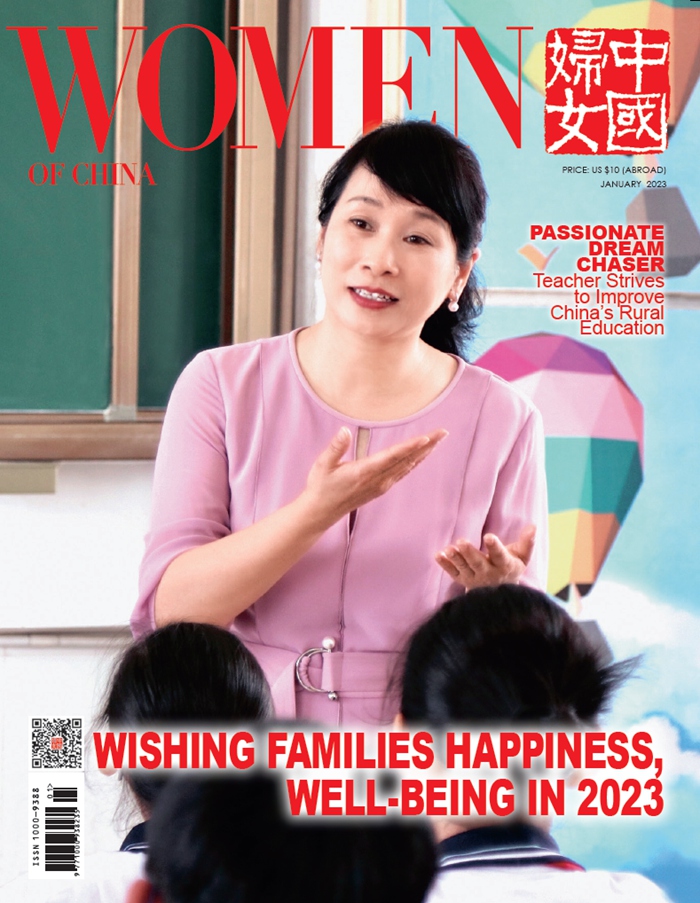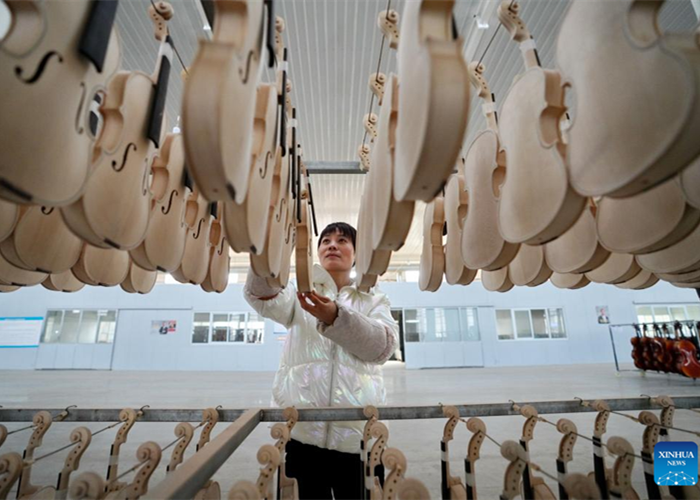Women Rangers Put Skills to the Test
Challenging Roles Call for Hard Work, Bravery and Dedication
Nearly every day for the past two-and-a-half years, Xu Chunmei and her teammates have patrolled forests in Heilongjiang Province.
Walking an average of 8 kilometers a day in areas near Chaoyanggou Forest Farm, the team's main duties are to set up and maintain infrared cameras, find and record the tracks of wild animals — especially endangered species — and remove traps placed to catch such creatures.
The team, comprising six women rangers age 27 to 38, was founded in February 2019 for wildlife conservation work in the area, part of the Northeast China Tiger and Leopard National Park in Jilin and Heilongjiang provinces under the supervision of the Dongning Forestry Bureau.
Li Gang, deputy director of the farm, said: "Twenty rangers in Chaoyanggou work 23,000 hectares of forests. The women rangers have their advantages for such duties. They are good at making work plans and finding more-detailed information."
Xu, 31, who was born on a forest farm, said: "I am a third-generation forestry worker and I grew up in the forests. After graduating from junior high school in 2007, I continued my studies at Qiqihar Forestry School, a technical secondary school in Qiqihar, Heilongjiang."
After graduating in 2010, she returned to her hometown and became a forestry worker, following in the footsteps of her father and grandfather.
"I was appointed to patrol nearby forests to stop illegal lumbering work and prevent forest fires," Xu said. "At the end of 2018, when I heard that the team of wildlife conservation rangers was recruiting women, I wanted to give it a try."
"My father gave me great support and told me forest workers should walk deep into the mountains. However, I seldom had the chance to walk that far."
As a forestry worker with several years' experience, she was accepted as a member of the conservation rangers team immediately after submitting her application.
Unlike Xu, Wu Tong joined the team after trying different jobs in cities such as Harbin, capital of Heilongjiang, and Beijing.
The youngest member of the team, Wu, 27, was also born to a forestry family. When she graduated from junior high school in 2010, she chose to study accountancy at a technical secondary school in Harbin.
"I graduated from the school in 2013 and tried jobs as a saleswoman and accountant in Harbin and Beijing," she said. "After a few years away, I decided to return to my hometown."
In early 2019, Wu joined the Dongning Forest Bureau before being accepted for the conservation team.
Xu said: "We usually set out for the forest at 8 am and return at about 4 pm. In the northeast, it is really cold in winter and snow can sometimes reach up to our knees."
Wu said: "It is hard to walk quickly in thick snow. Our shoes become extremely wet when we walk for several hours, but the snow makes it easier for us to find clear footprints of wild animals."
In summer, the team members often start out at about 4 am and return before the hottest part of the day in the afternoon.
"It is hard to see far in summer because of the dense leaves on the trees," Wu said. "We are often scared by snakes and some worms that appear suddenly."
Xu said: "During our work, we continually study wildlife. I am happy when I can accurately identify the footprints of wild animals."
"We also use good methods to punish those found placing traps to catch animals. For 30 days, we make them lead us to locations where there are more traps."
"We are following our predecessors in working in the mountains. I love the natural environment and wildlife in the mountains, which motivated me to seek this position."
Wu added: "In our spare time, we visit forest farms and villages to promote knowledge of wildlife conservation and also tell people not to hunt. Wildlife conservation requires efforts from all of the society."
Flying High
Song Yin had all the qualities needed to become an athlete, but after graduating from university, she joined an aerial rescue team, rising to become a captain.
Born in Shanghai in 1986, Song started work as a pilot when she was 24, has taken part in more than 200 missions and saved 218 people who were trapped.
A pilot with the East China Sea No 1 Rescue Flight Team, one of the four such teams affiliated with the Ministry of Transport, she is one of the China's first women captains on maritime rescue helicopters.
"It's cool being a pilot, and rescuing people is something that is absolutely worth doing," she said.
"In my experience, gender plays no role in a pilot's performance. Men and women pilots are trained through the same standard system."
Majoring in ocean navigation at university, Song spent two years obtaining her pilot's license after training at home and abroad. Four years after joining the rescue team, she was promoted to captain at age 28.
A captain faces challenges in finding time and space amid strong winds and high waves to lower a lifeguard to rescue people trapped at sea.
"Because the lifeguard can be close to a boat at one moment and 10 meters away from it the next, the captain needs 100 percent concentration to prevent the lifeguard crashing into the boat," she said.
"Waves out at sea can be as high as 7 or 8 meters sometimes."
A rescue mission five years ago left a deep impression on Song. Minutes after taking off, she learned that the location of a fishing boat was 37 km farther away than originally reported.
Flying farther means the crew has less time to do its work at a rescue scene, given the limited range of a helicopter.
When the crew reached the scene, Song saw that the rear deck of the boat was on fire. If the fire had continued, the vessel's gas and oil tanks could have exploded at any time, possibly resulting in deaths. Heavy smoke from the vessel could also have caused the hovering helicopter's engine to surge.
Song decided to hover at a higher altitude to avoid the dense smoke and to find the right time to lower a lifeguard to the deck. All 10 fishermen were rescued quickly.
"I've encountered numerous unexpected situations and dangers in rescue work, but each time I return to base with those who have been saved, I feel a deeper dedication to this profession," she said.
Song represented the nation's ocean rescue system at an international industrial conference in Europe, at which she discovered there are far more women pilots in the West than in China.
There are only two women pilots in Song's team — herself and a classmate from university. Song said the team only recruits women pilots in the year they graduate, unlike in the West, where they are also recruited at other times.
"I don't think women feel more strain than men in this profession, as it's not an easy job being a pilot — men or women," Song said.
When she was a teenager, many sports schools showed an interest in Song. Now, she is not only adept at operating a helicopter, she is also good at running marathons, cycling, rock climbing, tennis and basketball.
She said sports help improve psychomotor skills, which are crucial for pilots, and also helps her maintain fitness.
"Looking back, I find that all the dots in my life are actually interconnected and have made me who I am today. Each step in one's life is traceable," she said.
Heated Discussion
Gu Huijing, 17, a schoolgirl in Shenzhen, Guangdong Province, has become a hot topic on Chinese social media.
In April, Gu won first prize in a competition for vehicle maintenance in Dongguan City, Guangdong, which attracted 33 teams from across the province.
News of a woman winning such a competition trended on Sina Weibo, generating heated discussion over gender and career choices.
One netizen said: "Women should not be influenced by old-fashioned thinking, but should do whatever it takes to discover their interests and strengths. There are more possibilities out there."
Gu said: "Many people think vehicle maintenance is a job for men. That's a stereotype. I don't think gender has anything to do with choice of occupation."
She became interested in robots and driverless cars after watching car-themed movies such as Fast & Furious and Transformers when she was at primary school.
Born in 2004, Gu decided to major in automobiles while she was in junior high school.
When she told her parents this, they were surprised. "They thought I was joking, but they respected my decision and advised me to take responsibility for my decisions, no matter how hard things were in the future," she said.
Driven by passion, Gu is also a realist. "I think the future of the automobile industry is bright, because we cannot live without vehicles. We also obviously need food, clothes and houses," she said.
When she started learning about cars in 2019, she was often confused by their different parts and circuit diagrams.
"I thought it couldn't be that hard to repair cars when I started to take the course, but I was totally wrong," Gu said.
In addition to lessons in math, English and Chinese, the course covers chassis maintenance, engine reassembly and circuit diagram recognition. "For me, the most difficult part is reading the circuit diagrams," Gu said.
She began preparing for the competition in Dongguan two months after starting junior high school.
"Competition at our school is intense, so I had to work hard to stay in the running," she said.
Although still a sophomore, she was required to compete against seniors.
From 8 am to 5 pm, Gu had lessons as usual, but at night she attended a training camp with about 30 students.
Her teacher once tried to persuade her to give up, as she was a sophomore, was not as knowledgeable as the seniors, and because no women had ever been selected for the competition. "But I insisted that I would carry on," Gu said.
Even though she is taller than many of her peers at 1.70 meters, she is not strong enough to carry some heavier car parts, but constant training and hard work won her the chance to represent her school in the competition.
"My record for reassembling an engine is 26 minutes — some 30 seconds less than the school record," said Gu, who enjoys photography and playing chess in her spare time.
Thanks to her outstanding performance in the competition, she received an offer from a college in Shenzhen, and she does not need to take the national college entrance exam, or gaokao.
Gu said she wants to choose a career related to automobiles, but before doing so, she has another mission.
"The first thing to do when I turn 18 is get a driver's license. I can't wait to drive," she said.
Gu was busy during the summer vacation, when she was interviewed several times by national and local media.
"I'm happy to give these interviews, which are valuable and meaningful for me. I treasure the chance to let more people know about vehicle maintenance," she said.
Tangping or "lying flat" — a trend among young people related to working less, or not at all — is becoming a buzzword, but not for Gu.
"I have a goal and I will work harder to make it happen. I will be responsible for my choices," she said.
Gu has a bigger ambition for the new semester, which started on Sept 1.
"The next goal is to represent my province in a national competition," she said. "If possible, I also want to take part in the World-Skills Competition and demonstrate Chinese craftsmanship to more people."
(Source: China Daily)
Please understand that womenofchina.cn,a non-profit, information-communication website, cannot reach every writer before using articles and images. For copyright issues, please contact us by emailing: website@womenofchina.cn. The articles published and opinions expressed on this website represent the opinions of writers and are not necessarily shared by womenofchina.cn.








 WeChat
WeChat Weibo
Weibo 京公网安备 11010102004314号
京公网安备 11010102004314号